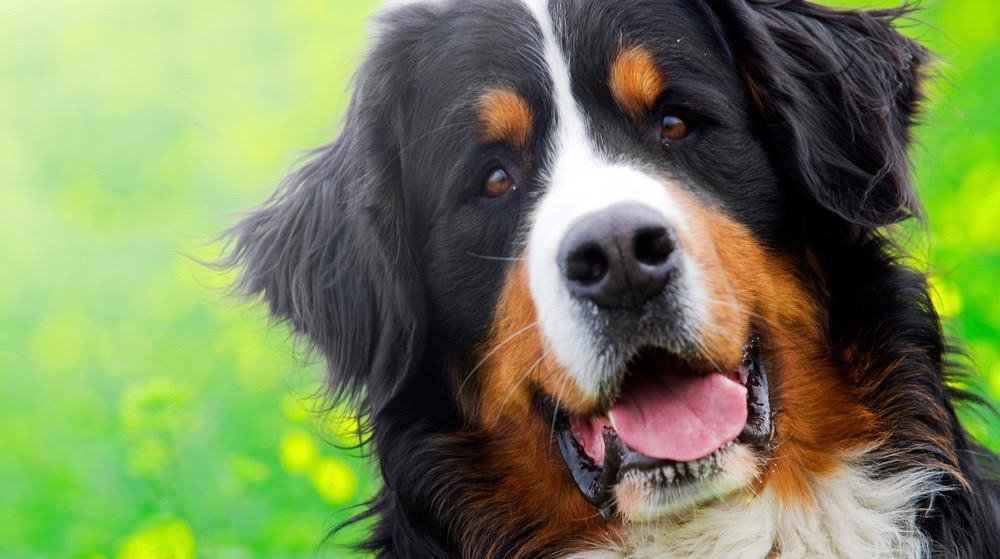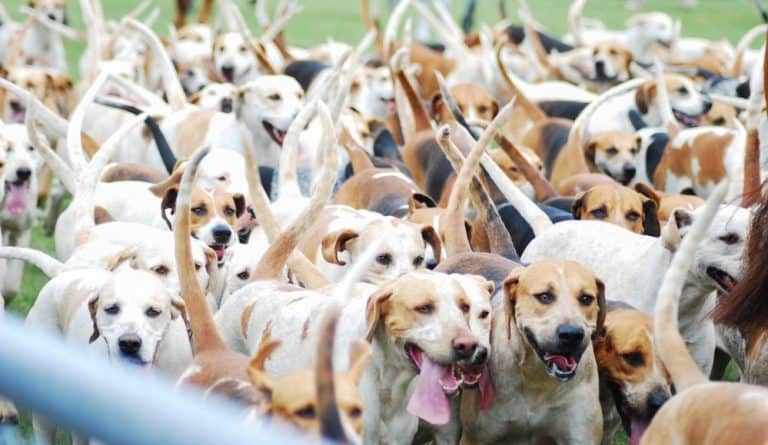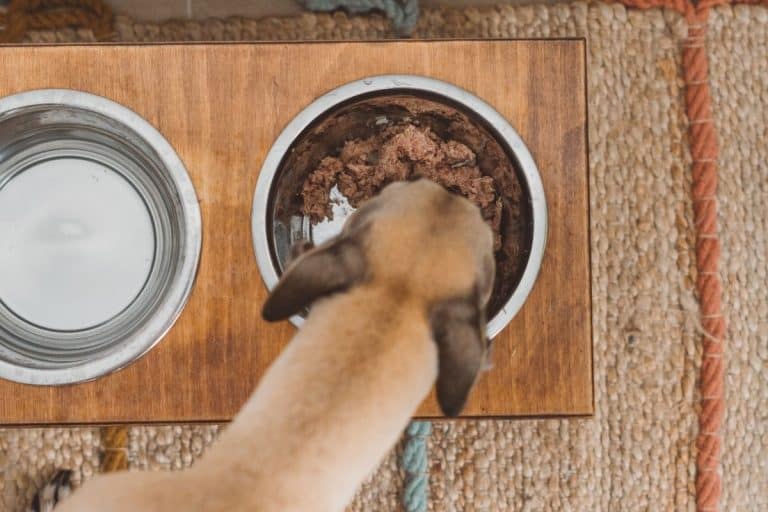Bernese Mountain Dog Growth Chart – Bernese Weight & Size Chart
Given their teddy bear-like appearance as puppies, it is natural to want to adopt a Bernese Mountain Dog.
Yet, given their immense size, it is important to know what to expect as they move beyond their adorable appearance into their adult size.
Consulting with a Bernese Mountain Dog growth chart is an excellent way to get a prediction as to how big your dog will be once he stops growing.
A growth chart is one thing, but you also need to know how to properly measure your dog, how to know that your dog’s size is healthy, and what you can do if your dog is overweight.
When Do Bernese Mountain Dogs Stop Growing?
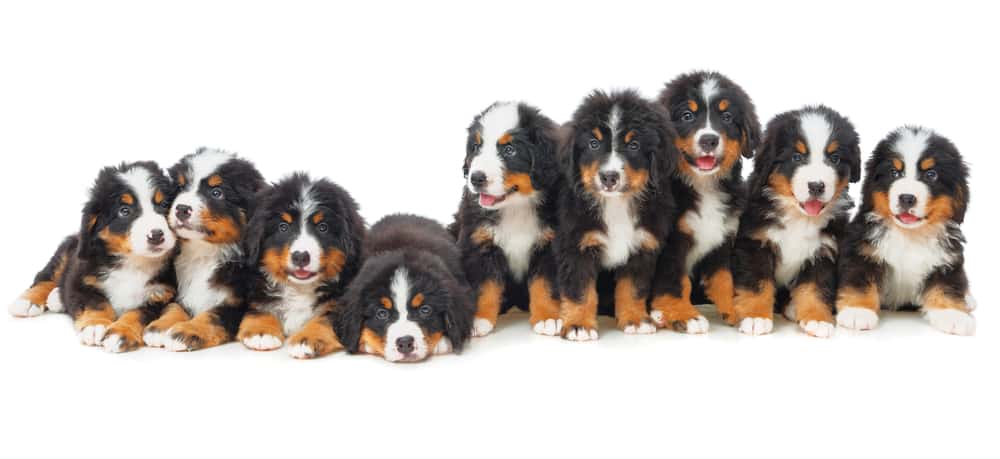
Large breeds like the Berners tend to grow slowly compared to small breeds. A small breed will grow to its full size within a year, but a large breed can take up to two years to be fully grown.
In the case of the Berners, it can take between two and three years for a dog to reach its full height and weight, and after that, they can still fill out and get bulkier.
Up until the age of 18 months when other dogs are already fully grown, these dogs are still puppies and look awkward on their feet.
Bernese Mountain Dog Size Chart
You can use the Bernese Mountain Dog Weight Chart to determine if your dog is reaching his milestones at the appropriate times.
For such a big dog, Berners start out surprisingly small. At one month their size varies from only 20 to 25 cm, and they weigh only 2.5 – 4.5 kg.
After one more month, things look quite different. The minimum size of a 2-month-old pup is now 28 cm and the maximum size is 36 cm.
The smallest dogs will weigh three times their birth weight and the largest will have doubled their birth weight.
By the time they reach six months, the puppies have grown quite a bit. The smallest dogs stand half a meter tall and the biggest dogs stand 61 cm tall. Now you can already see that the puppies will be big, heavy dogs.
At six months, the smallest dogs weigh 25 kg and the biggest dogs weigh 38 kg.
When they reach one year, the smaller dogs stand 58 cm tall and the bigger dogs will be 70 cm tall. The smaller dogs will weigh around 39 kg and the bigger dogs will weigh around 52 kg.
Bernese Mountain Dog Weight Chart
| Age | Weight in Kg | Height in Cm |
|---|---|---|
| 1 Months | 2.5 kg - 4.5 kg | 20 cm - 25 cm |
| 2 Months | 6.0 kg - 10 kg | 28 cm - 36 cm |
| 3 Months | 11 kg - 17 kg | 36 cm - 44 cm |
| 4 Months | 15 kg - 26 kg | 42 cm - 51 cm |
| 5 months | 20 kg - 33 kg | 47 cm - 56 cm |
| 6 months | 25 kg - 38 kg | 50 cm - 61 cm |
| 7 months | 30 kg - 42 kg | 53 cm - 64 cm |
| 8 months | 34 kg - 35 kg | 55 cm - 67 cm |
| 9 months | 36 kg - 47 kg | 56 cm - 68 cm |
| 10 months | 37 kg - 49 kg | 57 cm - 69 cm |
| 11 months | 38 kg - 51 kg | 58 cm - 70 cm |
| 12 months | 39 kg - 52 kg | 58 cm - 70 cm |
Bernese Mountain Dog Growth Chart – What To Expect
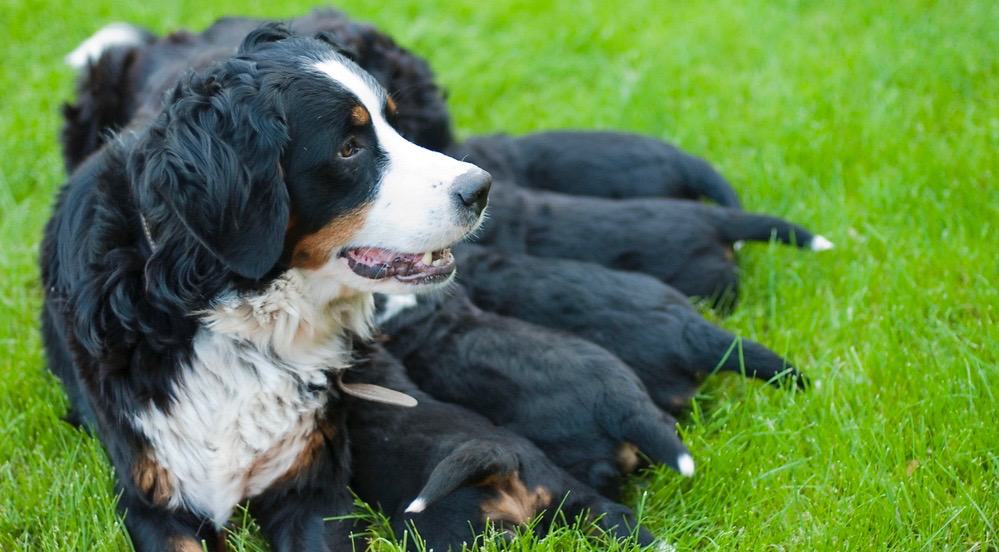
Birth – 2 Weeks
Puppies are born blind and deaf. In the first week, puppies spend their time feeding and sleeping.
When they are two weeks old, they are still blind and deaf, but they have huge heads and strong jaws.
They still spend most of their time feeding and sleeping, but they now make an attempt to stand up, they also try to sit up. The litter members also start taking notice of each other.
3 Weeks – 12 Weeks
At three weeks old, puppies’ eyes are partially open. They can walk properly but still fall over easily. They still spend a lot of their time sleeping.
Even at this early age, they love interacting with people and each other. These cuddly puppies enjoy being picked up.
By six weeks, the puppies are very playful and bite everything in sight. They have a good eye and mouth coordination. When they are eight weeks old, the puppies are ready to go home with their owners.

From 10-12 weeks and up to 16 weeks, puppies start to look taller and their bodies appear sleeker. Around this time, you can begin to house train your puppy, but don’t expect him to know when it’s time for him to go outside. Housetraining takes time!
Also, this is the time to socialize your dog. This is important for Berners. Start training your dog and remember to reward him for good behavior.
Distract him from chewing on your shoes by giving him a toy to play with. This is a time to keep close watch over your dog that’s starting to look big, but is still a puppy.
4 Months – 8 Months
At four months, your puppy will weigh 15 – 26 kg and by eight months 34 – 45 kg depending on his size. Although he is quite a sizable dog now, he is still a puppy.
Between four and five months, Berners lose their baby teeth. This may be a stressful time for them as their gums become tender with the eruption of their adult teeth. If your dog seems to lose interest in food at this stage, it might help if you feed him soft food.
This is also the time when puppies begin to lose their puppy coats. Help your dog by brushing his coat to get rid of the puppy fluff. Over the next couple of weeks, his adult coat will start showing. The fluff around the ears is the last to go.
Seeing that this is a very big dog, it’s important to train and socialize him as it will become increasingly difficult to do the bigger he gets.
It is not unusual for Berners of this age to have several growth spurts and to appear to be growing unevenly. Needless to say, at this age, just like human teenagers, they are a bit clumsy.
8 Months – 12 Months
At this stage, Berners are young adults, but that does not mean that they are physically or mentally mature.
At eight months, you will get a good idea of how big your dog will eventually be. For instance, a dog that weighs 45 kg when it’s a year old may put on another 4.5 – 13.5 kg in the following 2 – 3 years.
At this stage, their adult coat is still coming in and keeps growing. This is also the time when Berners start growing feathered fur on their legs.
These young adult dogs start being troubled by reproductive hormones between 8 – 12 months. These hormones can affect a dog’s behavior in ways that can be difficult for owners to deal with. They become restless and appear to have forgotten everything they have been taught.
Male dogs need a strong hand during these months. Owners need to be strict when their dog is acting up, but at the same time need to keep praising him for good behavior.
Many owners have their dogs spayed or neutered before they become sexually mature.
Adult
From around eight months to a year of age, Bernese Mountain Dogs are young adults, but they are not fully grown physically and they are not mentally mature.
These dogs are slow to mature. Most of them only reach their adult height and weight between 2 and 3 years of age.
They can continue to fill out even after they’ve reached three years of age. By 3 – 4 years, they are in the prime of their lives.
These dogs can be high maintenance. They need a lot of attention, daily exercise, and some of them are heavy droolers.
You’ll need to wipe the slobber if you don’t want it on everything. These dogs also shed a lot and their coats need frequent brushing.
Having said that, you can’t get a dog with a nicer disposition. Bernese Mountain Dogs are calm and good-natured and get along with children and other pets.
How Big Do Bernese Mountain Dogs Get?
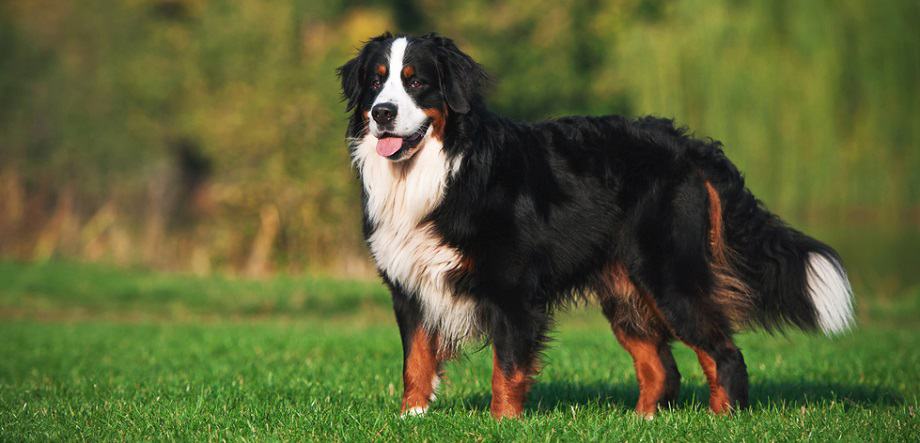
You already know that the Bernese Mountain Dog is a big dog breed, but you might have trouble imagining how big do Bernese Mountain Dogs get.
Looking at your dog’s current size on a Bernese Mountain Dog growth chart to get a future forecast of size is one way to get an idea, but not the only way.
When you look at a Bernese Mountain Dog’s paws, you can tell how much more growing he needs to do before the pup will fill out those paws.
If you can see what the dog’s parents looked like, that is probably the best clue on the final size that you’ll get, but you could always look into a DNA test for guidance.
Will Neutering/Spaying Affect My Bernese Mountain Dog Growth?
As a dog owner, you will want to do everything that you can to ensure that your dog grows up happy and healthy. One of the most standard actions to take is to have your puppy spayed or neutered before they reach full maturity.
New research has indicated that you might not want to sterilize your dog before maturity, because it might affect their growth.
Early spaying and neutering is still widely practiced and it will not make this big breed small, but it might harm their joint development.
Large dogs that are fixed too young have been shown to have mobility and joint problems as they age, so consider that when deciding when to do the surgery.
Bernese Mountain Dog Height Chart
According to the American Kennel Club, male dogs measure 25 to 27½ inches at the withers, and female dogs measure 23 to 26 inches.
Bernese Mountain Dogs are slightly longer than they are tall. They tend to grow unevenly. During one month, their hind legs may look disproportionately tall and the very next month, the front legs might look too tall.
For a long time, their heads also look huge compared to the rest of their bodies.
How To Properly Weigh And Measure A Berner?
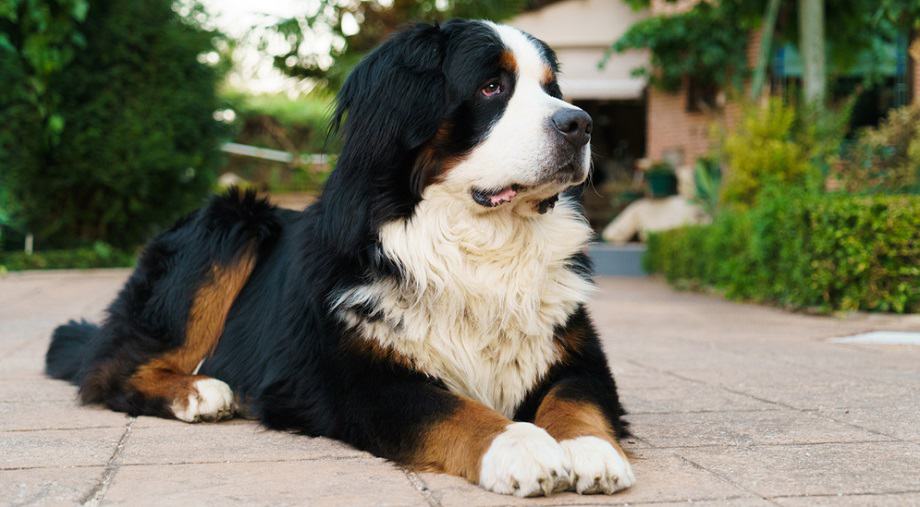
Using a Bernese Mountain Dog size chart is great, but you still need to be able to collect the stats.
There are a couple of ways to do this, but it will get tricky when your dog gets big, as we know he will. You should weigh your dog once a month to make sure that he is on track.
When the puppy is small, you can use a scale at home by weighing yourself and then weighing yourself holding the puppy, and marking the difference.
The difference is the puppy’s weight. After a while, you will not be able to lift the puppy, however, and can either visit the vet for weight checks or purchase a large scale for your home.
Great Swiss Mountain Dog vs Bernese Mountain Dog Size
Given their similar appearance and that they are both large dogs, it is easy to assume that a Great Swiss Mountain Dog and a Bernese Mountain Dog are the same breed. Despite the similarities, the breeds are not the same.
The Berner is smaller than the Great Swiss Mountain Dog and it is noticeably so. The average weight of a Bernese Mountain Dog is between 70 and 115 pounds, with a height between 23 and 28 inches.
By comparison, the Great Swiss Mountain Dog weighs between 85 and 140 pounds, with a height between 24 and 29 inches.
What Is A Berner’s Neck Size?
Knowing your dog’s neck size might not have come into your mind as far as growth goes, but it is important. Normally puppies will go through 2 to 3 collars as they grow and their necks thicken.
It is important to measure your dog’s neck with a tape measure around the area where you will be putting the collar in order to buy the right size. Get an adjustable collar for a puppy so you don’t need to replace it right away.
The average neck size for an adult Bernese Mountain Dog is 20 to 26 inches, but naturally, a puppy’s will be smaller.
Bernese Mountain Dog Body Condition Score (BCS)
The idea of a Body Condition Score (BCS) might not be incredibly well-known by dog owners, but it is something to be aware of.
It is a method of measuring your dog’s body size to determine whether the dog is a healthy weight. It is a little bit trickier to measure a Berner because they are fluffy and will not be as obviously overweight as other breeds are.
The BCS works on a scale from 1 to 9, with a healthy score being right about 5. It is not anything that is measured with tools, but it is measured through touch and visually.
A 5 is where a dog should have a waist that is visible and a tummy that is tucked uptight. The ribs should also be easy to find under the fur, but not stick out much. A 1 means the dog is dangerously underweight and a 9 means that he is obese.
How To Help Your Berner Lose Weight If He Is Overweight
It might be hard to determine your dog’s BCS score with all of his fur, but if it has been determined that your dog is overweight, it is a good idea to help him lose the extra pounds.
Make sure that your vet agrees that your dog needs to lose weight and start with tips from her before you work on your own regimen. Here are some things that you can try to help your dog.
- Boost his exercise. Is your dog getting enough exercise? A Berner is a working dog breed so if he is not getting his fill of exercise, he will gain unwanted weight.
- Look at his foods. Are you feeding your dog the healthiest food for his needs? The food should be high in protein and have quality ingredients. If it has fillers, it is a good idea to switch to something less calorie-heavy.
- Cut down on treats and extras. If you are feeding your dog scraps from the table or giving him extra treats, it is time to stop. Your dog does not need them and it will help him lose weight.
Factors That Affect Bernese Mountain Dog Puppy Growth
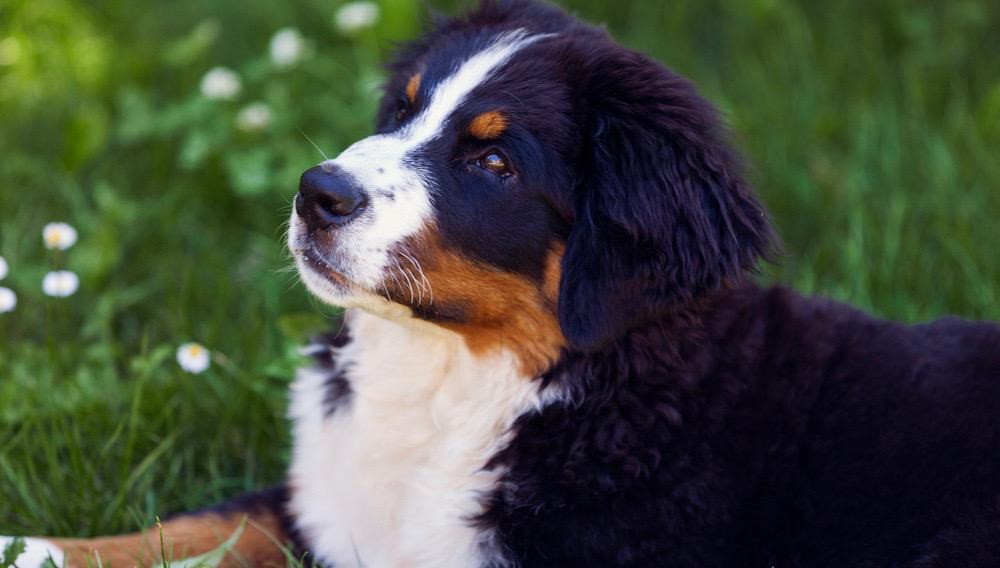
Genetics
Most people determine the future size of their puppy by looking at the size of both parents. Taking into account the parents’ breed, size, and weight can give an excellent indication of how big a puppy will get in the future.
Large dogs typically have large offspring, and smaller breeds will have small offspring.
The size of the parents will have a significant bearing on what a Bernese puppy will look like by one year of age.
Nutrition
For your dog to grow optimally and be healthy, you must give it a healthy, balanced diet. You can choose to feed your dog a raw diet, which will mainly consist of raw meat and cooked vegetables, but that is a lot of work for busy people
You can also choose to feed your dog a good quality, commercial dog food. If you are confused about all the brands that claim their food is the best, ask your vet for advice.
Bernese Mountain Dogs usually eat twice a day. Don’t give your dogs too many snacks between meals. If you do, give him a little less food at the next meal.
Physical Activity & Health
Bernese Mountain Dogs are energetic by nature. They were bred as working dogs and need to be stimulated mentally and physically.
Bernese Mountain Dogs need at least an hour of exercise every day. You can split this into more two or more exercise periods. One regime that works well is 30 minutes of vigorous yard play and 30 minutes walking.
If you live in an area that gets snow, you can take your dog for a tumble in the snow, he will love that. In fact, if you live in a warm climate, you must take care that your snow-loving dog doesn’t overheat.
How Long Are Bernese Mountain Dogs Pregnant?
Like other dogs, Bernese Mountain Dogs are pregnant for about 63 days, and like people, their pregnancy lasts over three trimesters of about 21 days each.
In the first few weeks, there is no way to tell if your dog is pregnant, not even by feeling and prodding her will you be able to discover if she’s pregnant.

After a while, your dog might look as if she has gained weight and that would be an indicator for you.
It’s normal for expectant dogs to seem listless and lose their appetite. This might also be an indicator for you.
Take your dog to the vet to make sure if you have a suspicion that she is pregnant.
How Many Puppies Do Bernese Mountain Dogs Have?
Bernese Mountain Dogs can have a litter of one to 14 puppies, but the average is eight puppies.
The size of the litter depends on a range of factors, including the current health of both parents, the health history of both parents, the size of the mother, and the quality of food the parents are fed.
What If My Bernese Mountain Dog Is Not the Right Weight
Your dog is the right weight if you look from the top, and he clearly has a waistline and when you look at him from the side there is a very clear abdominal tuck.
If this is not the case, then your dog is overweight. You can also feel their ribs. You should be able to easily feel them but you should also feel a slight layer of fat. If the ribs are prominent, your Bernese is too thin.
Berners don’t naturally seem to suffer from being overweight. Unless you overfeed them, these dogs maintain a healthy weight.
If you suspect that your dog is over-or underweight, take him to the vet. Whatever you do, make sure you always feed your dog top-quality dog food that is high in protein, minerals, and vitamins, and low in cereals.
What Is The Life Expectancy Of A Bernese Mountain Dog?
Large dog breeds have a shorter lifespan compared to medium and small dogs. The average Bernese Mountain Dog only lives for about 8 years.
This is a short lifespan if you compare it to the average dog’s lifespan, which is 11 to 12 years. The smallest breeds can live up to 15 years.

In addition to being a giant size and therefore prone to a shorter lifespan, Berners are also more prone to cancer than any other breed. Many of these dogs die early because of cancer.
How Much Does It Cost To Own A Bernese Mountain Dog?
The average price for a healthy Bernese Mountain Dog is $1,500, but that is just the initial cost.
In the first year of its life, your dog needs several vaccines, needs to be neutered or spayed, and needs all the basics like a dog bed, bowls, grooming brushes, collar and tags, lead, harness, and toys, all of which will add to your expenses.
To this, you must add food costs, which can be considerable for a big dog that needs a lot of food.
Your Bernese Mountain Dog will cost a minimum of $180 per month and over his lifetime his cost can add up to $20,000.
Bernese Mountain Dog Genetics and Common Health Problems
There are a few health concerns for Berners that you should be aware of.
Histiocytosis (cancer) is a hereditary disease and the most common cancer in Bernese Mountain Dogs, representing 25% of all cases. Cancer can cause early death.
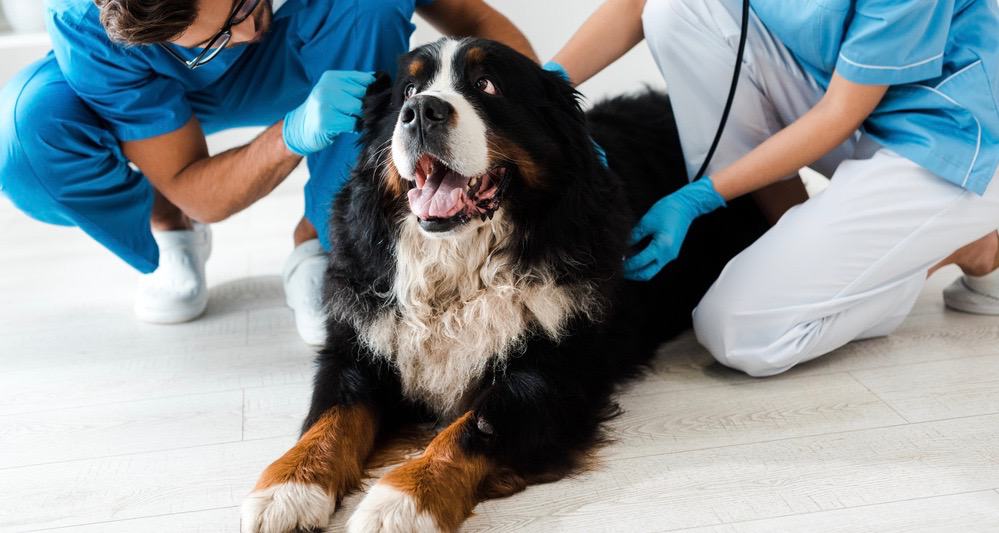
Canine Hip Dysplasia (CHD) is common among large breeds, including Berners. CHD causes the femur bone to connect incorrectly to the hip socket. After some time, this condition results in arthritis in the affected joint. CHD is a hereditary condition in Bernese Mountain Dogs
Another common hereditary condition in Berners is Elbow Dysplasia. This condition is a malformation of the dog’s elbow joints. This condition can be noticed early – between 4 – 10 months. Symptoms of the condition include the build-up of fluids in the joints, and a diminished ability to use the forelimbs properly.
Progressive Retinal Atrophy (PRA) is an inherited eye disease that causes the retina to degenerate. As a result, the dog has only partial vision or becomes completely blind. There is no cure for this condition.
Bernese Mountain Dogs also suffer from von Willebrand’s Disease, a common hereditary blood clotting disorder in dogs. It causes severe bleeding even from relatively minor injuries.

